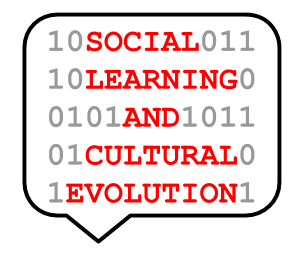In social species, learning from others, i.e. social learning, is one of the cornerstones of cognitive development. Social learning has been shown to increase the learning speed of individuals, but also enables them to reach a higher performance in comparison with learning individually. Social learning also enables local populations to develop a culture that can evolve over time. Realising social learning in artificial systems faces many challenges requiring inputs from machine learning, robotics and evolutionary biology.
The aim of this workshop is to promote discussions on social learning and cultural evolution with a special emphasis on the future of of the field. Social learning has been actively studied in psychology but is still in its infancy in artificial systems. Many open questions remain, such as when is social learning advantageous, or what kind of information should be transferred. These questions have been studied but a consensus has yet to be reached, mainly because of the difficulty to compare results in social learning due to the absence of a common research framework. This workshop is devoted to discuss and establish such a framework that will push the research forward.
The core of the workshop will consist of short presentations from contributors on their work in the field (current or historical), collective research goals and milestones in social learning and cultural evolution or new concepts, modelling techniques or research questions. Presenters are encouraged to address any of the following topics (though this list is not exhaustive):
- Social Learning Mechanisms
- Social Information Transfer
- Transfer learning
- The interaction between social and non social learning
- The interaction between learning and evolution
- Environmental Variability, Environmental Complexity, and Social Learning
- Social Learning Strategies
- Social Learning and Life History Evolution
- Models of Learning in Nature
- The Evolution of Culture
- Communication
- Social Networks and Social Contagion on networks
- Group structure and learning bias
- Social Robotics
- Grounded (Animat) models of Social Learning
- Do our definitions match those used in other related fields (i.e Imitation, Culture, ...)
- Human Cultural Evolution (Cumulative Culture)
- Co-operation
- Gene-Culture Co-Evolution/ Dual Inheritance Theory
- Philosophy of Culture
- Memetics
The workshop will conclude with a fishbowl discussion on the future of Social Learning and Cultural Evolution research in ALife.
We ask potential contributors to submit an extended abstract (1 page). We are open to presenters who are contributing during the main ECAL conference to also talk about their work during the workshop in order to have additional discussions. PhD students and young career academics who are new to the field are encouraged to submit to this workshop.
